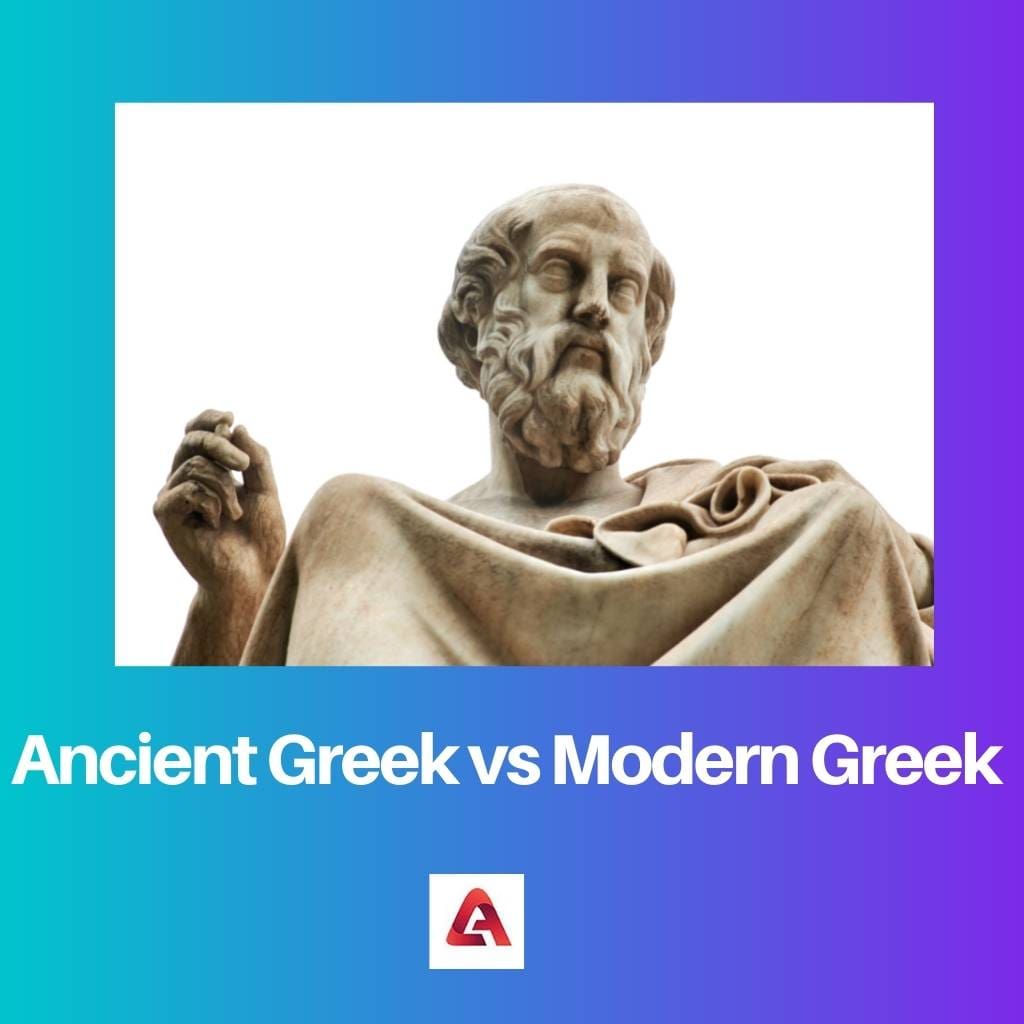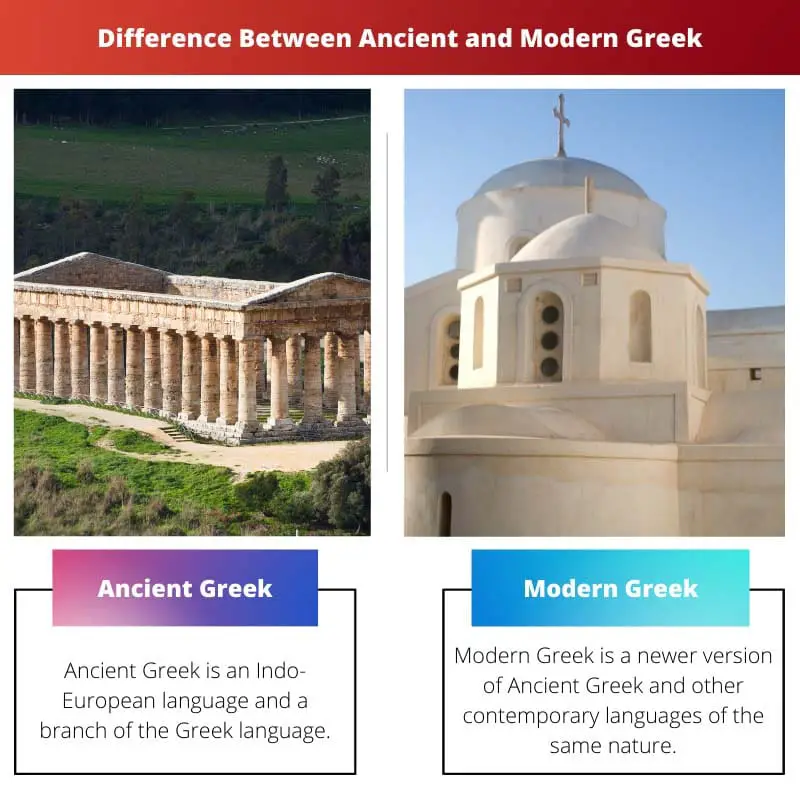It is said that Unity in Diversity, and to maintain one, we need to preserve the other. In this diversified world, languages play a crucial role in uniting yet diversifying thousands of people.
The Greek language is one of the most spoken languages, with its legs stretching up to 34 countries. Having a glorious history, this language holds significance in Greece primarily.
However, there are two main branches of this language. One is Ancient Greek, and the other is Modern Greek. Both of these are important yet different.
Key Takeaways
- Ancient Greek had more complex grammar, including a dual number, while Modern Greek has simplified grammar.
- The pronunciation of certain letters and letter combinations has shifted in Modern Greek.
- The vocabulary has evolved, with Modern Greek incorporating many loanwords from other languages.
Ancient Greek vs Modern Greek
Ancient Greek was the classical language of the Athenians. It had long and short vowels, many diphthongs, double and single consonants, and a pitch accent. Modern Greek is much simpler, and the pitch accent has been changed to a stress accent, consisting of only five vowels and short consonants.

Ancient Greek was popular as a major Indo-European language between the 9th century BC to the 6th century BC. It is said that this used to be the language of historians, philosophers, and people who used to write plays and dramas.
On the other hand, Modern Greek is a modified and newer version of ancient Greek and other similar languages.
The language staged itself in front of the world somewhere around 1453 AD. This language is different from the previous one in terms of pronunciation, dialect, and many other things.
Comparison Table
| Parameters of Comparison | Ancient Greek | Modern Greek |
|---|---|---|
| Definition | Ancient Greek is an Indo-European language and a branch of the Greek language. | Modern Greek is a newer version of Ancient Greek and other contemporary languages of the same nature. |
| Origin | Originated somewhere between 19th and 16th century BC. | It originated around 1453 AD. |
| Uses | Mostly used in ancient plays, philosophies, etc. | Used widely by not only Greek people but people from other cultures too. |
| Spoken in | It is not spoken in its true from anywhere. | Spoken in many countries in the name of Greek. |
| Letters | Ancient Greek only had capital letters. | It has small letters also. |
| Vowels | Presence of long and short vowels. | Only short vowels. |
| Forms of verb | It had four moods of a verb, namely- Indicative, Imperative, Subjunctive and Optative. | It had modal verbs, auxiliary verbs, gerund, and participle. |
| Relevance | Relevant as a historical language. | Relevant because of being spoken and written widely. |
What is Ancient Greek?
Ancient Greek is an Indo-European language to be spoken in over 34 countries. The era of the dominance of this language is divided into many phases.
Some of them are- The Mycenaean Period, Archaic Period, and Classical Period. In each period, the pronunciation and phonological variations were different.
As per the data and research, this language is presumed to be spoken between the 9th century and 6th century BC.
From the period of the Renaissance to the early start of the 20th century, this language, along with the Latin language, gained crucial significance in Europe. Even today, in some of the educational institutes in Europe, this language is taught as a compulsory subject.
Apart from this, Ancient Greek is also taught in many universities across the world.
Coming to the salient features of Ancient Greek, it consists of 24 letters in total. Initially, this language was written in capital letters only. Even the concept of space between words was not popular then.
This language had four basic moods, namely- Indicative, Imperative, Subjunctive, and Optative.
But nowadays, this language is rarely used by people, writers and speakers. However, some of the major books, such as The Harry Potter, were translated into Ancient Greek to maintain the existence and popularity of the language.

What is Modern Greek?
Modern Greek is also referred to as just Greek by native speakers and common people. This originated as the successor to the Ancient Greeks but soon made its own identity with all its distinctive elements and modern textures.
This language is mostly spoken in Greece and Cyprus. Speakers of this language are from many communities.
Modern Greek has made spectacular changes in Ancient Greek. Following are some of such differences or updates-
- Modern Greek has both capital and small letters.
- It has replaced the B, D, and G sounds of Ancient Greek with V, TH, and GH, respectively.
- It has introduced modal verbs, auxiliary verbs, and gerunds to Greek grammar.
- Both definite and indefinite articles are present in Modern Greek.
All these changes have made Modern Greek outrun Ancient Greek. However, being a branch of Ancient Greek itself, it preserves certain values and attributes of the same.

Main Differences Between Ancient and Modern Greek
- The origin of Ancient Greek took place around 19th to 16th BC, while Modern Greek became popular during 1453 AD.
- Ancient Greek is older than Modern Greek.
- Ancient Greek is the branch of Greek, while Modern Greek is the branch of Ancient Greek.
- Ancient Greek only had capital letters, but Modern Greek had both capital and small letters.
- Ancient Greek had optative, indicative and imperative moods of the verb, while Modern Greek has gerund and auxiliary verbs in it.

References
- https://books.google.co.in/books?hl=en&lr=&id=h5tKJvApybsC&oi=fnd&pg=PP17&dq=ancient+greek+language&ots=Arx0GX8gzU&sig=_pY_NNyRS8At6vSqoQR6CxrmSyk&redir_esc=y#v=onepage&q=ancient%20greek%20language&f=false
- https://academic.oup.com/dsh/article-abstract/19/2/221/922932

I’ve always been fascinated by the evolution of languages. This article has deepened my understanding of Ancient and Modern Greek in a remarkable way.
I feel the same way, Nmiller. The rich linguistic history detailed in this article is truly captivating.
The way this article explains the evolution of the Greek language is captivating. I hope to read more articles like this.
I agree, Georgia. It’s intriguing to see the transformation of languages through history.
Absolutely, Georgia! This article has given me a deeper appreciation for the Greek language.
As a language enthusiast, I found this article to be incredibly informative. The comparison between Ancient and Modern Greek is fascinating.
This article truly sheds light on the evolution of language, particularly in the context of Greek. I’m grateful for the insights it provides.
Absolutely, Sharrison. It’s amazing to see how languages undergo changes over time, especially in the case of Ancient vs Modern Greek.
This article provides a wealth of knowledge about the Greek language. It’s enlightening to learn about its development.
I couldn’t agree more, Matthew. The Greek language has such a rich history and it’s important to understand its evolution.
I’m so glad I stumbled upon this article. It’s truly eye-opening to learn about the differences between Ancient and Modern Greek.
This article is a testament to the profound changes that the Greek language has undergone. The information is both enlightening and enriching.
I wholeheartedly agree, Jayden. The article provides a comprehensive comparison of the Greek language’s development.
Absolutely, Jayden. It’s remarkable to witness how language continues to evolve, and this article captures that essence perfectly.
The intricacies of the Greek language’s transformation are eloquently portrayed in this article. It’s truly a remarkable piece of knowledge.
Indeed, Urobinson. The intricate details provided here have expanded my appreciation for the Greek language’s development.
I appreciate the detailed comparison presented in this article. It’s thought-provoking to understand the evolution of such a historic language.
I completely agree, Louis. The linguistic journey of the Greek language is truly remarkable.
This article has given me a new perspective on the Greek language. The nuances explained are truly intriguing.
I share the same sentiment, Mreid. It’s amazing to delve into the intricacies of Ancient and Modern Greek.
The historical context provided in this article is invaluable. I’m grateful for the opportunity to learn about the Greek language in such depth.
I couldn’t agree more, Anthony. This article offers a remarkable insight into the linguistic evolution of Greek.
I found this article to be exceptionally enlightening. It deepened my understanding of the Greek language’s transformation over time.
Such an interesting article! I had no idea about the differences between Ancient and Modern Greek.
Yes, I never knew about these differences. It’s fascinating to learn about how languages evolve over time.